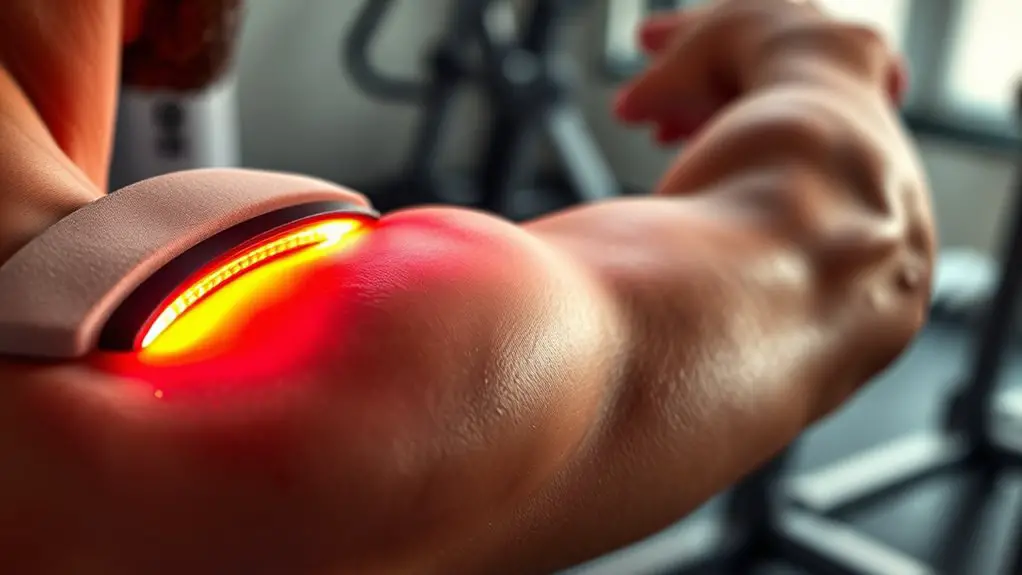To recover quickly, tactical athletes must understand their body's healing process. Focus on proper nutrition, including protein for muscle repair and carbohydrates for energy replenishment. Stay hydrated to maintain performance levels and enhance recovery. Don't underestimate the importance of quality sleep for muscle growth and cognitive function. Incorporate active recovery techniques like stretching and low-intensity exercise to boost blood circulation. By optimizing these strategies, you'll discover how to enhance your recovery even further.
Understanding the Physiology of Recovery
When you consider recovery, it's essential to understand the physiological processes at play. Your body undergoes several stages after exertion, primarily involving inflammation, repair, and adaptation. Initially, when you push your limits, tiny tears form in your muscles. This can feel uncomfortable, but it's a necessary part of building strength. Your immune system kicks in, sending cells to the site to reduce inflammation and begin repair.
During recovery, your body also replenishes energy stores, primarily glycogen, which fuels your muscles. Hormones like cortisol and testosterone play significant roles here, balancing stress and recovery. It's all about optimizing these processes to enhance performance while preventing injury. Proper nutrition strategies can significantly impact how effectively your body recovers.
Recognizing these physiological responses equips you to take charge of your recovery. By tuning into your body's signals, you can create a personalized recovery strategy that not only accelerates healing but also empowers you to achieve your goals with freedom and resilience.
The Role of Nutrition in Speeding Recovery
While your body works hard to recover after intense training, nutrition plays an essential role in speeding up that process. Eating the right foods can provide the fuel you need for ideal recovery, allowing you to bounce back faster and stronger.
Consider focusing on these key nutrients:
- Protein: Helps repair and build muscle tissue, ensuring your body recovers effectively. Think lean meats, eggs, and legumes. Adequate protein intake reduces muscle soreness and accelerates recovery time.
- Carbohydrates: Replenish your energy stores, giving you the stamina to tackle your next challenge. Picture sweet potatoes, oats, and fruits.
- Healthy Fats: Support hormone production and reduce inflammation. Imagine avocados, nuts, and olive oil.
The Importance of Hydration
Although you might focus on what you eat, hydration is just as essential for recovery. Staying properly hydrated helps maintain energy levels, supports muscle function, and speeds up the healing process. When you're sweating it out, losing fluids can impact your performance and recovery.
Here's a quick overview of hydration's role:
| Aspect | Impact | Recommendation |
|---|---|---|
| Hydration Level | Affects endurance | Drink water regularly |
| Electrolyte Balance | Maintains muscle function | Consider electrolyte drinks |
| Recovery Time | Speeds up muscle repair | Aim for at least 3 liters/day |
| Mental Clarity | Enhances focus and reaction | Hydrate before and after workouts |
| Overall Health | Supports bodily functions | Monitor fluid intake daily |
Proper hydration helps avoid fatigue and cramps, allowing you to perform at your best during training and recovery.
Sleep and Recovery: The Overlooked Factor
Sleep is often the most overlooked aspect of recovery, yet it plays a crucial role in a tactical athlete's performance. It's not just about getting shut-eye; it's about the quality of that sleep. Without it, your body struggles to rebuild and recharge.
Imagine the benefits of proper sleep:
- Enhanced muscle repair: Your muscles need time to heal and grow stronger.
- Improved cognitive function: Sharp decision-making can be the difference in high-stakes situations.
- Boosted immune system: A strong immune system keeps you ready for whatever comes your way.
Prioritizing sleep isn't just a luxury; it's a necessity for peak performance. When you give yourself the freedom to rest, you're setting the stage for explosive recovery and resilience. Quality sleep supports muscle recovery, cognitive function, and overall injury prevention as well. Don't underestimate the power of a good night's sleep—embrace it, and watch your capabilities soar.
Active Recovery Techniques for Tactical Athletes
Active recovery techniques are essential for tactical athletes looking to optimize their performance and recovery. Staying hydrated, incorporating stretching and mobility drills, and engaging in low-intensity cardio can make a significant difference in your recovery process. Hydration is key to replenishing lost fluids and aiding in muscle repair during this crucial recovery phase. Let's explore these methods and see how they can enhance your overall well-being.
Importance of Hydration
While you may focus on strength and endurance training, hydration plays a crucial role in your recovery as a tactical athlete. Staying well-hydrated helps your body bounce back, ensuring you're ready for your next mission. Think about the benefits of proper hydration:
- Enhanced energy levels: Quench your thirst to fuel your fire.
- Improved cognitive function: Keep your mind sharp and focused, ready to make quick decisions.
- Faster muscle recovery: Flush out toxins and reduce soreness, so you can move freely again.
When you prioritize hydration, you're not just drinking water; you're investing in your freedom to perform at your best. Remember, every drop counts in your journey to peak performance. Stay hydrated, stay strong!
Stretching and Mobility Drills
Incorporating effective stretching and mobility drills into your routine can greatly enhance your recovery as a tactical athlete. These drills help in maintaining joint health, reducing muscle stiffness, and improving overall performance. By dedicating time to these exercises, you can release your body's potential and feel more liberated in your movements.
| Stretching Type | Benefits |
|---|---|
| Dynamic Stretching | Increases blood flow, warms up muscles |
| Static Stretching | Enhances flexibility, reduces tension |
| Foam Rolling | Breaks down muscle knots, aids recovery |
Make these drills a non-negotiable part of your recovery plan. You'll notice the difference not just in performance but in your overall sense of freedom and well-being.
Low-Intensity Cardio Benefits
Low-intensity cardio serves as an essential component of recovery for tactical athletes, helping to promote blood circulation and facilitate the removal of metabolic waste. By incorporating light activities into your routine, you can enhance your recovery process while enjoying the freedom of movement.
Consider these benefits:
- Gentle jogs along scenic trails, allowing you to clear your mind and connect with nature.
- Swimming in calm waters, where the fluid resistance soothes your muscles and refreshes your spirit.
- Cycling on flat paths, combining fresh air with a rhythmic motion that keeps your heart engaged without overexertion.
These low-intensity cardio options not only aid recovery but also invigorate your body and mind, making you feel alive and ready for the next challenge.
The Impact of Recovery Technologies
Recovery technologies can greatly enhance your muscle repair and boost circulation, leading to faster recovery times. They also play an important role in optimizing sleep quality, which is essential for tactical athletes like you. Let's explore how these advancements can benefit your performance and overall well-being. Additionally, incorporating techniques like compression therapy can significantly reduce muscle soreness and improve recovery efficiency.
Enhanced Muscle Repair
As you push your limits in training and competition, enhanced muscle repair becomes essential for maintaining peak performance. Recovery technologies offer innovative solutions that help you bounce back faster and stronger, allowing you to seize your freedom on the battlefield or the field.
Consider these key benefits:
- Cryotherapy: The icy embrace reduces inflammation, soothing your muscles like a gentle winter breeze.
- Electrical Stimulation: This technology mimics natural muscle contractions, promoting healing and getting you back in the game without delay.
- Foam Rolling: Think of it as a personal massage, releasing tension and breaking down knots that hold you back from full mobility.
Embrace these tools, and you'll reveal your body's potential, ready to conquer whatever challenges lie ahead.
Improved Circulation Benefits
While you push your body to its limits, improved circulation can be your secret weapon in the recovery process. Enhanced blood flow helps deliver essential nutrients and oxygen to your muscles, speeding up the healing of micro-tears from intense training. You'll feel less soreness and stiffness, allowing you to move freely and get back to action sooner. Recovery technologies like compression garments and pneumatic devices can boost circulation, helping you feel revitalized and ready for your next challenge. By investing time in these methods, you're not just recovering; you're reclaiming your freedom to perform at your best. Embrace improved circulation, and watch how it transforms your recovery journey, empowering you to push boundaries without the burden of fatigue.
Sleep Quality Optimization
Achieving ideal sleep quality is crucial for tactical athletes, especially since restful nights can greatly enhance your recovery process. To optimize your sleep, consider these recovery technologies that can elevate your experience:
- Sleep tracking devices: Monitor your sleep stages to understand what works for you.
- White noise machines: Create a calming environment that drowns out distractions.
- Smart mattresses: Adjust firmness and temperature for personalized comfort.
Embracing these tools can help you reclaim those essential hours of restorative sleep. Remember, a well-rested body is a powerful body, ready to tackle the challenges ahead. Prioritize your sleep and watch your performance soar, granting you the freedom to push limits and achieve greatness. Your journey to peak recovery starts with the right night's rest.
Psychological Aspects of Recovery
Understanding the psychological aspects of recovery is essential for tactical athletes, since mental resilience can greatly impact physical healing. Your mindset plays a vital role in how quickly you bounce back. Cultivating a positive attitude and setting realistic goals can motivate you during recovery.
Here's a quick overview of key psychological factors that can aid your recovery process:
| Psychological Factor | Impact on Recovery |
|---|---|
| Positive Mindset | Enhances motivation |
| Goal Setting | Provides direction |
| Visualization | Improves performance focus |
| Stress Management | Reduces anxiety |
| Social Support | Boosts morale |
Additionally, embracing mindfulness in athletic performance can further enhance your recovery by promoting presence and engagement during the healing process.
Strategies for Implementing Recovery Protocols
Having a strong psychological foundation sets the stage for implementing effective recovery protocols. To truly embrace your freedom in recovery, consider these strategies:
- Prioritize Sleep: Create a cozy sleep environment, allowing your body to replenish and rejuvenate, readying you for your next challenge.
- Hydration Rituals: Keep water close at hand; a simple act of sipping throughout the day can energize your body and elevate your mental clarity.
- Active Recovery: Engage in light activities like yoga or walking; these not only aid muscle recovery but also enhance your sense of well-being. Engaging in low-intensity exercise helps flush out lactic acid and increases blood flow, further supporting your recovery process.
Frequently Asked Questions
How Do Age and Fitness Level Affect Recovery Times?
If you think recovery's a sprint, think again! Age and fitness level drastically impact your recovery times; younger, fitter folks often bounce back faster, while older or less fit individuals may take a bit longer.
What Role Does Mental Health Play in Physical Recovery?
Mental health's vital in your physical recovery. If you're stressed or anxious, your body's healing process slows down. Prioritizing mental well-being can enhance recovery, helping you feel more energized and ready for any challenge ahead.
Can Recovery Practices Vary by Tactical Discipline?
Absolutely, recovery practices can vary by tactical discipline. Each field demands different physical and mental stresses, so what works for one may not suit another. Tailoring your recovery approach enhances performance and overall well-being.
How Does Stress Impact Recovery Efficiency?
Stress can greatly hinder your recovery efficiency. It elevates cortisol levels, which can disrupt sleep, increase muscle tension, and slow down healing. Managing stress is essential for optimizing your recovery and overall performance.
Are There Genetic Factors Influencing Recovery Rates?
You might say recovery's a dance, where genetics lead the rhythm. Some folks naturally waltz through recovery quicker, thanks to inherited traits, while others might need a little more time to find their groove.




